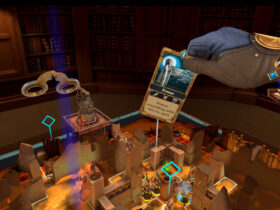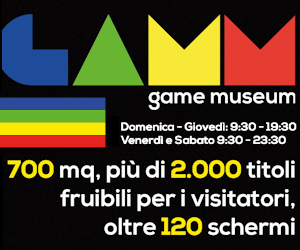It is not the first time that we talk about Stormborn Studio, an all-Italian team working on VR, which is building the promising Runes: The Forgotten Path. We at Oculus Rift Italy had the opportunity to interview Giacomo Lucchini, game designer of Runes, talking about different topics, from the most general to the most specific and controversial. Stay with us to discover what it means to develop a game in virtual reality, and doing so in Italy.
First, we would like to know what is your relationship with virtual reality.
We are extremely fascinated by it, the possibilities of use are really vast and I would say that our whole project was a consequence of the purchase of the first Oculus dev kit. Speaking of virtual reality, that mystery and that air of novelty that wrap this technology fills us with enthusiasm. We feel like the pioneers of a new era that has not yet been established, there are many uncertainties, but we have great faith that soon virtual reality will be part of our lives.
What do you think of Oculus Rift as a hardware? Which are the strengths and weaknesses?
Oculus Rift is a cornerstone of the technology of this century. I think that it is not a perfect device, and there is still much work to do, but the real turning point was the demonstration that virtual reality is at hand, we have technology and knowledge enough for it to become real. Its strengths (an immense viewing angle joined with the positional tracking of the head) clearly show how virtual reality is no longer science fiction and you can actually develop extraordinary things with it. The feeling of “being in the same place”, the biggest strength of Oculus, is something never tried before.
Its weaknesses are the technical limitations, image persistence, display resolution, pixel size. The jump from the DK1 to DK2 was remarkable but we are faced with a developer kit that still requires many adjustments before it can be marketed. Seeing the timing within they moved from DK1 to DK2 we believe that we will see soon enough a marketable model.
[su_quote]Speaking of virtual reality, that mystery and that air of novelty that wrap this technology fills us with enthusiasm.[/su_quote]
You have got to try Project Morpheus? If yes, do you think that might be a rival for Oculus Rift?
Unfortunately not, but we have carefully followed the scene, there is much mystery to this device, when we will end the demo I’d like to talk to someone from Sony to evaluate a partnership. The fact is that developing for PC is easier (and cheap) then it will probably be our main choice.
[su_animate type=”fadeInLeft”]
 [/su_animate]
[/su_animate]
What do you think instead of portable HMD Gear VR? Would you develop content for this mobile platform?
Currently the mobile GPU are not yet powerful enough to provide a breathtaking setting as a video card. However, the absence of the classic video cable opens the door to very interesting elements of game design. I think you could call Oculus the device virtual reality games for desktop, while Gear VR is the version for mobile games. Our team is more PC and console gaming oriented, but we do not close any future possibility.
How does virtual reality collide with your design philosophy?
Runes is a First Person immersive environment, extremely elegant and eye-catching, full of special effects and magic. To enter virtual reality is almost a moral duty. We are structuring the gameplay so that it is 100% compatible with the Oculus but at the same time, for economic reasons, we can not only bet on this market because it still highly uncertain. So we are doing a carefully thought out game for both Oculus both and the classic controller.
Virtual reality imposes to completely change the approach to game design: what do you think are the advantages and obstacles caused by this technology?
The advantages are many: there are feelings that simply do not exist in the games on the screen. Depth, height and vertigo, oppression or freedom due to design environments are unique experiences and totally innovative.
[su_quote] Virtual reality, if operating at 100%, can really change a lot of things in our society.[/su_quote]
The gameplay mechanics that start with the head tracking also are manifold: to aim for “looking” at the point where we want the effect to happen, while your hands are busy doing other things, having to fix something with the look or not being able to look at something, tilt your head to look behind a wall, these are all things that through classic controls do not have the same effect and strong emotions to the player.
The only important obstacle is the need to take into consideration the technical limitations to prevent motion sickness, avoid frantic gameplay, keep fixed references in the player’s view, find interesting alternatives to graphical interfaces and the cutscene (which within the Oculus are bad).
Do you Think that Oculus Rift has already the right tools to open up to mass adoption? And, conversely, what do you think would be the main obstacles to the spread of this technology?
The instruments are definitely in place, especially following the acquisition by Facebook; the problem lies in the the applications. There are still a few titles/interesting applications that can make a difference, I think like any technology we will need a gradual entry into our lives, it won’t happen a mass adoption.
The only obstacles are motion sickness, final costs and market development, in my opinion they should invest more on developers (cough … cough… cough… write…us…) to build a killer app, whilst for the hardware I think they’re really traveling fast.
[su_animate type=”fadeInRight”]
 [/su_animate]
[/su_animate]
Which do you think will be the impact of virtual reality on the world of technology and society in general?
Endless possibilities, new ways of communication, entertainment, learning, working. Virtual reality, if operating at 100%, can really change a lot of things in our society. It will also bring new social problems as well as innovations. I do not exclude that in many (as already happens in many fields now) will have problems of alienation and isolation, however, this is not a problem of the technology itself.
What do you think of the acquisition of Oculus VR by Facebook?
I honestly do not have a precise idea. If the move was an investment because Mark Zuckerberg has seen a huge potential we think is a good thing, capital is immense and greatly helps the development hardware to make the Oculus perfect; but if Facebook will affect in some way on the commercial choices, I think there is to worry about. I don’t like the idea of communicating through virtual reality with text messages advertising here and there.
What do you think will be the applications of Oculus Rift outside of gaming?
Those already realized: virtual tours (museums, culture, architecture, tourism) and advertising promotions (a sort of interactive experience to promote a product with no real interaction by the viewer, a bit like Rift Coaster to understand), fields in which we are being financed by ourselves for venturing a little, while for the future i think it will really reach the most disparate fields, robotics (drones with cameras that transmit to Oculus) medicine, communications, learning (remote learning classes ). In short, will see some good things happen!
Clicca sulla copertina per leggere

















